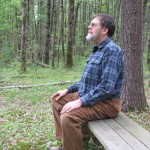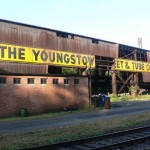It’s one of my favorite memories.
On the last day of the small Pagan gathering, perhaps a dozen of us had hiked down the hill, piled into our cars, and made our way to the neighborhood pancake house. Sweaty and grimy, smelling of woodsmoke and insect repellent, clad in hiking boots and sneakers, shorts and blue jeans, we had taken one long table in the middle of the restaurant.
The restaurant itself is a celebration of all things down-to-earth and Vermont. I’ve seen farmers enjoying a plate of eggs still wearing their barn boots–and been grateful to the ones considerate enough to hose them off first–as well as hunters stoking up either before or after a morning of deer hunting, families with babies in high chairs, and, of course, in leaf season, the occasional tourist.
There’s nothing occult or New Age about the Sugar House. It’s just there, as it has been for decades, with it’s fluorescent lights, tiled floor, and picnic style benches and tables: a local fixture, and the home of the best pancakes and maple syrup in Central Vermont.
Over pancakes and eggs and coffee and orange juice, then, our group of old friends had laughed and joked, told stories of our kids, our families, and our daily lives. We’d caught up on the lives of community members who were not there this year–who had gone back to school, who was getting married or moving across country, divorcing or building a new house–in one last, loving effusion of our sense of ourselves as Tribe, before we would return to atomized lives among our non-Pagan friends and neighbors.
It was, as every year, a wonderful meal.
But my memory comes from a moment at the end of the meal, when a stranger from another table approached us, and hesitantly asked, “Excuse me. I don’t mean to be rude–I couldn’t help overhearing a little. Are you all… Pagans?”
We said we were, and she smiled, and nodded, and went back to her own table.
Understand, none of us were wearing anything remotely like flowing robes. I don’t even think there were any tie-dyed shirts in evidence; any pentacles or other occult jewelry were either small or tucked into the flannel shirts and tees we were wearing.
Nor had our conversation been overtly esoteric. To the best of my recollection, we weren’t speaking of gods or goddesses, ritual drumming techniques or magickal tools. Instead, our conversation had focused on daily life: our kids, our plans, our small triumphs and disappointments.
But somehow, seeing how we interacted, this woman whom none of us even knew had figured out that there was something different about us from the usual crowd at the Sugar House. Somehow, she had figured out that we were Pagans.
 It is my belief that her clue was how we loved each other, how we belonged to one another.
It is my belief that her clue was how we loved each other, how we belonged to one another.
We related to each other with the freedom and trust and happiness that comes of being in your deepest self with a group of others, not once only, but over and over again, over the course of decades. We belonged to each other in a way that is rare today, in our society of nuclear families and individualistic consumers. Perhaps only communities of monks or nuns have a similar experience–but an experience largely cloistered from the world, and, in any case, rooted in a religion far less world-embracing than Paganism.
The key to understanding us was our connectedness. Wiccans and Druids, shamans and Hellenes and Kabbalists, we had stood together in the firelight and joined together in love of the Old Gods; students and retirees, athletic and disabled, rural and urban, we had shared the cycles of our lives over many years.
The years that have passed have changed that community. Some of the faces that were at that table have been taken from us by death. Bitter quarrels have divided us, and time has only partially reconciled us. Formerly healthy adults have become disabled, children have become adults, and some of us have moved far, far away, never to return.
But the sense of connection remains. My own daughter I remember rocketing through the woods with a mini-tribe of younger Pagans, when she was only eight years old. “Mom!” she called out to me, one day as she dashed past. “Mom! Mom! We’re playing we’re like it was in the old days–like we’re a Pagan village!”
“Playing” indeed–but it was no game. It was real. I was there.
My daughter no longer considers herself to be a Pagan. Does that invalidate the time she spent in the “Pagan village” as a child? I think not. She is still close to many of the adults from that spiritual community, still discusses her spiritual life (which is alive and flourishing, albeit in a different form from my own) with not only me, but with many of those adults who knew her as that joyful wild child.
How common is it for our children, once grown, to remain close friends with their parents’ closest friends?
I hope it is common indeed, at least within the Pagan world. For, with my own daughter grown, my heart has room in it for my friends’ children. One of the joys of middle age, for me, is the sense of continuity and connection I have with my friends’ children as I watch them grow. This is true whether they remain Pagan–as some have–or not–as some have not.
This is, I think, because the connections we have with one another, whether within generations or spanning them, are much less about what we believe–a creed or common ideology–as about who we are.
We Pagans are a people in relationship with one another: a relationship deepened by our lived experiences of the Old Gods, but both wider and deeper than any single set of religious doctrines. We are rooted, in the final analysis, in Life–in shared Life: in community.
There has been a lot of talk, in recent weeks, about how Paganism is not really a community, how even the concept of “Paganism” as a single anything, as an identity, is meaningless.
As someone who has drunk deep from the well of a diverse and tradition-spanning Pagan community, I beg to differ. At our best, we grow and deepen in our love for one another, love that unites rather than divides by ideology; love that is shared with the earth; love that lasts even through pain and aging.
I’ve tasted this water. To my community, to my family, I say: do not settle for less.
If you build it, we will come.
Photo credit: Valerie Everett, under a Creative Commons Attribution license. This post is part of the 2010 Pagan Values blogging event.















